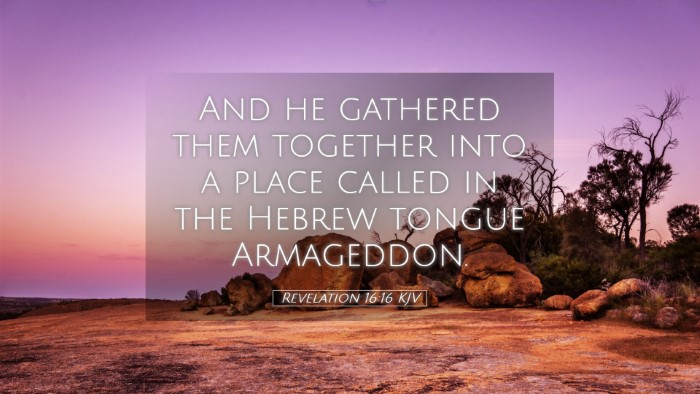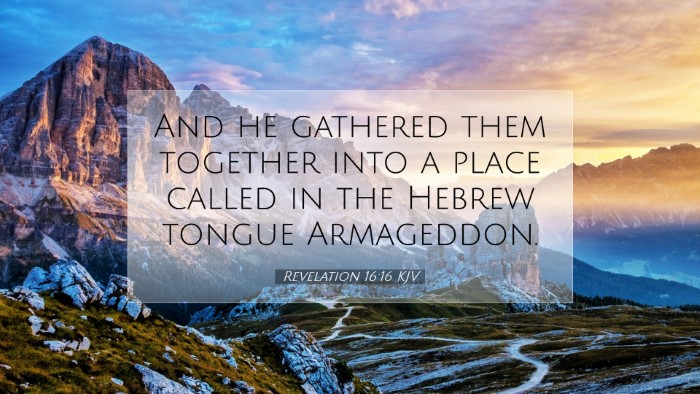Commentary on Revelation 16:16
Text of Revelation 16:16:
"And he gathered them together into a place called in the Hebrew tongue Armageddon."
Introduction
Revelation 16:16 concludes the series of plagues that afflict the earth and introduces the final confrontation in the eschatological narrative. This verse, often associated with one of the most significant prophetic battles, calls for a deep exploration into its theological implications and historical context.
The Gathering at Armageddon
In this passage, the term "Armageddon" has been subject to various interpretations and theological insights. It is essential to understand the implications of its Hebrew roots and its role within the apocalyptic narrative.
Meaning of Armageddon
Matthew Henry suggests that the name Armageddon may derive from "Har Megiddo," referring to a geographical location associated with significant biblical battles throughout history. This location, near the plain of Jezreel, represents both a literal and symbolic battleground where divine judgment is executed.
Albert Barnes emphasizes the spiritual significance of Armageddon as the culmination of cosmic conflict between good and evil. This battle signifies the ultimate triumph of God over the forces of darkness—an eschatological resolution where God’s sovereignty is established.
The Divine Invitation for Gathering
The phrase "he gathered them together" conveys the active role of God in orchestrating the events leading to this critical confrontation. Adam Clarke notes that God draws together not just individuals but entire armies from various regions, symbolizing the unification of opposition against the divine will.
The Purpose of Gathering
The gathering at Armageddon serves to fulfill God's purpose of final judgment. Various interpretations, as highlighted by both Henry and Barnes, suggest that this moment represents the zenith of divine retribution against a world steeped in rebellion. It stands as a divine declaration that God will ultimately reclaim authority over creation.
Theological Implications
The gathering at Armageddon raises significant theological discussions regarding God's justice, the nature of evil, and eschatological hope.
The Justice of God
As Matthew Henry articulates, the act of gathering nations for the day of judgment reveals God’s unwavering commitment to justice. The gathering serves as a reminder that God's patience has limits and that divine justice will prevail against all forms of wickedness.
The Reality of Spiritual Warfare
Adam Clarke reflects on the spiritual battle encapsulated in this verse, highlighting that Armageddon symbolizes the ongoing struggle faced by the faithful. The gathering foreshadows the climax of spiritual conflict, reminding believers that they are engaged in a warfare both seen and unseen.
Encouragement for Believers
For clergy and laity alike, the imagery of Armageddon serves as an encouragement. As Barnes notes, while the gathering portrays opposition against God, it also reassures the faithful that in the end, God is in control and will achieve victory. This assurance calls for perseverance in faith amidst ongoing struggles.
Practical Applications
The teachings derived from Revelation 16:16 can lead to profound personal and communal applications for contemporary believers.
- Preparation for His Return: Understanding the significance of this passage encourages believers to prepare their hearts and lives for Christ's imminent return.
- Active Engagement in Spiritual Warfare: Recognizing that spiritual battles are ongoing, believers are called to arm themselves with prayer, scripture, and community support.
- Proclamation of Justice: Pastors and church leaders are reminded to proclaim God's justice while offering hope and redemption for those who repent and turn back to Him.
- Awareness of God’s Sovereignty: This passage reinforces the necessity of believing in and trusting God’s sovereign plan, which prevails regardless of earthly circumstances.
Conclusion
Revelation 16:16 captures a pivotal moment in the grand narrative of Scripture. Through the insights of Henry, Barnes, and Clarke, we glean rich theological, historical, and practical lessons that challenge and inspire believers today. Understanding Armageddon not only as a future event but as a call to present faithfulness is essential for all who seek to deepen their relationship with God and his word.


